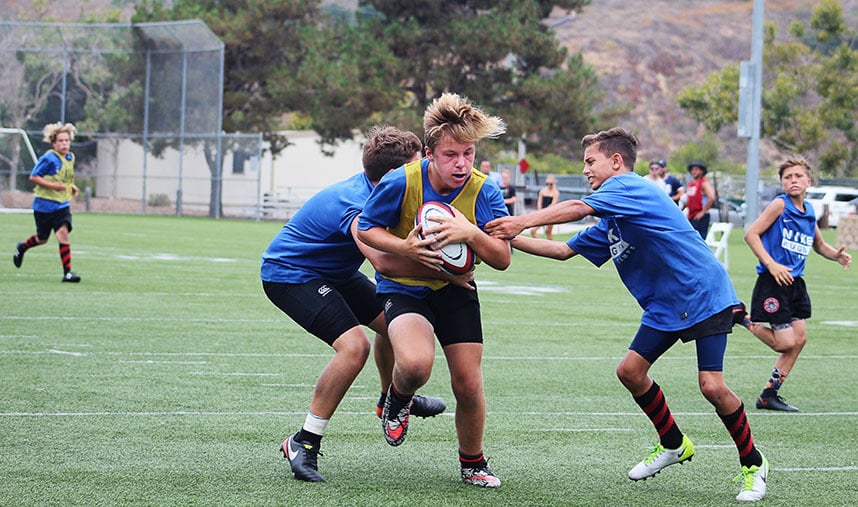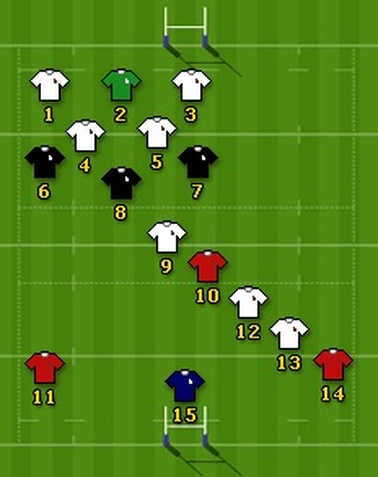To play rugby, you need to understand its rules and skills. It’s a thrilling sport that requires teamwork and strategy.
Rugby is a game of strength, speed, and agility. Imagine running with the ball, dodging opponents, and scoring a try. It’s exhilarating. Whether you’re a beginner or looking to refine your skills, understanding the basics is crucial. This guide will help you learn the fundamentals of rugby, from the rules of play to essential techniques.
By the end, you’ll be ready to step onto the field with confidence. Let’s dive into the world of rugby and uncover what makes this sport so unique and exciting.
Introduction To Rugby
Rugby is an exciting and physical sport. It is played worldwide and has a rich history. Understanding how to play rugby can be rewarding. This guide will introduce you to the basics.
History Of Rugby
Rugby began in the early 19th century. It originated in England at Rugby School. Legend says a student, William Webb Ellis, started it. He picked up the ball and ran with it during a soccer game. This act changed the game forever.
Rugby has grown since then. It split into two main types: Rugby Union and Rugby League. Today, it is played in many countries. The Rugby World Cup is one of the biggest sports events globally.
Basic Rules
Rugby is played with two teams. Each team has 15 players in Rugby Union and 13 in Rugby League. The game is played on a rectangular field. The goal is to score points by carrying the ball over the opponent’s goal line.
Players can pass the ball backward or sideways. Forward passes are not allowed. Tackling is used to stop opponents. When a player is tackled, they must release the ball.
There are different ways to score points. A try, worth 5 points, is scored by touching the ball down in the opponent’s in-goal area. A conversion kick, worth 2 points, follows a try. Penalty kicks and drop goals are other ways to score.

Credit: www.ussportscamps.com
Essential Gear
When learning how to play rugby, understanding the essential gear is crucial. The right equipment ensures safety and enhances your game. Below, we break down the key gear components with a focus on safety equipment and proper attire.
Safety Equipment
Safety is paramount in rugby. The game involves heavy physical contact. Wearing the right gear can prevent injuries. Here’s what you need:
- Mouthguard: Protects your teeth and gums from impact.
- Headgear: Reduces the risk of head injuries. Soft padded caps work well.
- Shoulder Pads: Offers cushioning to your shoulders and upper body.
- Shin Guards: Protects your shins from kicks and tackles.
Proper Attire
Wearing the right clothing can improve your performance. It also ensures comfort and flexibility during the game. Consider the following:
- Rugby Shirt: Made of durable, breathable fabric. Provides flexibility and absorbs sweat.
- Rugby Shorts: Reinforced for durability. Allows free movement.
- Socks: Long and thick. Offers support and prevents blisters.
- Boots: Designed for grip on the field. Choose those with studs for better traction.
Investing in the right gear keeps you safe and comfortable. It helps you focus on the game and perform better. Always check the fit and quality of your gear. Proper equipment is a game-changer.
Basic Skills
Rugby is a thrilling, fast-paced sport that requires a variety of skills. Understanding the basic skills is crucial for any beginner. These skills form the foundation of the game. By mastering them, players can improve their performance and enjoy the game more.
Passing Techniques
Passing is a key skill in rugby. It allows players to move the ball quickly. The most common pass is the lateral pass. To perform it, hold the ball with both hands. Swing your arms to the side. Release the ball in a smooth motion. The ball should travel to your teammate without spinning.
An accurate pass keeps the game flowing. Practice passing with a partner. Focus on your aim and strength. A good pass can make a big difference.
Tackling Basics
Tackling is essential in rugby. It stops the opponent from advancing. To tackle safely, keep your head to the side. Aim for the opponent’s waist. Wrap your arms around their legs or waist. Pull them to the ground with controlled force.
Always keep your head up. This prevents injuries. Practice tackling with a coach or partner. Good tackling skills are vital for defense. They help your team regain possession.
Position Roles
Understanding the position roles in rugby is crucial for new players. Each role has unique responsibilities and skills. Let’s break down these roles into two main categories.
Forwards Vs Backs
Rugby players are divided into forwards and backs. Forwards are usually bigger and stronger. They focus on winning possession of the ball. Backs are faster and more agile. They focus on running, passing, and scoring tries.
| Forwards | Backs |
|---|---|
| Prop | Scrum-half |
| Hooker | Fly-half |
| Lock | Center |
| Flanker | Wing |
| Number Eight | Full-back |
Key Responsibilities
Each position has specific tasks. Let’s look at the key responsibilities for each role.
- Prop: Provides stability in the scrum. Supports the hooker in lineouts.
- Hooker: Throws the ball in lineouts. Hooks the ball in the scrum.
- Lock: Jumps in lineouts. Pushes in the scrum.
- Flanker: Tackles opponents. Secures the ball in rucks.
- Number Eight: Controls the ball at the back of the scrum. Links forwards and backs.
- Scrum-half: Feeds the ball into the scrum. Passes the ball from the base of rucks and scrums.
- Fly-half: Directs the team’s attack. Decides whether to pass, kick, or run.
- Center: Breaks through the opposition’s defense. Supports the wingers.
- Wing: Finishes attacks by scoring tries. Provides speed on the outside.
- Full-back: Defends against opposition kicks. Joins the attack when possible.
Understanding these key responsibilities will help you know what to do on the field. Each role is essential. Work together to win the game.
Game Strategies
Rugby is a thrilling and fast-paced sport. Understanding game strategies is key to success. Players must work together and use effective tactics. This section will cover Offensive Plays and Defensive Tactics. Mastering these strategies will give your team an edge.
Offensive Plays
Offensive plays focus on scoring tries and gaining ground. Teams use various methods to break through the opponent’s defense. Here are some common offensive plays:
- Line Breaks: Players run through gaps in the defense line.
- Ruck and Maul: These formations help retain possession of the ball.
- Set Pieces: Includes scrums and lineouts to restart play and gain advantage.
Coaches often create set pieces to surprise the defense. Quick passes and well-timed runs are essential. Communication is vital. Players must call out plays and signals.
Defensive Tactics
Defensive tactics aim to stop the opposition from scoring. A strong defense can turn the tide of the game. Here are some key defensive tactics:
| Technique | Description |
|---|---|
| Tackling | Bring down the ball carrier to stop their advance. |
| Defensive Line | Form a line across the field to block attackers. |
| Counter Ruck | Disrupt the opposing ruck to win back possession. |
Effective tackling is crucial. Players must aim low and use their shoulders. They need to stay alert and watch for gaps. Communication and teamwork are key. Players should support each other and cover weak spots.
By mastering these game strategies, players can enhance their performance. Understanding both offensive and defensive tactics is essential. Teams that work together and use these strategies will have a better chance of winning.

Credit: www.wikihow.com
Fitness And Conditioning
Fitness and conditioning play a crucial role in rugby. A player’s performance greatly depends on their physical fitness. This includes strength, endurance, speed, and agility. Let’s explore the key areas of fitness and conditioning for rugby players.
Strength Training
Strength training is essential for rugby players. It helps them tackle opponents, run faster, and avoid injuries. Here are some key exercises:
- Squats – Build lower body strength.
- Deadlifts – Improve overall power.
- Bench Press – Strengthen the upper body.
- Pull-Ups – Enhance back and arm strength.
Players should focus on compound movements. These engage multiple muscle groups. Training should be intense and consistent. Rest and recovery are also important. This prevents overtraining and injuries.
Endurance Building
Endurance is key for sustaining energy throughout the match. Rugby players need both aerobic and anaerobic endurance. Here are some tips:
- Running – Include sprints and long-distance runs.
- Interval Training – Combine high-intensity bursts with rest periods.
- Circuit Training – Mix strength and cardio exercises.
- Swimming – Great for low-impact endurance.
Endurance training should be varied. This prevents boredom and plateaus. Training sessions should mimic the demands of a rugby game. This includes short bursts of energy and longer periods of sustained effort.
Practice Drills
Practicing rugby drills is crucial for improving your skills. Drills help you master the basics and advance your game. They build muscle memory and improve teamwork.
Individual Drills
Individual drills focus on personal skills. They help you become a better player. Here are some effective drills:
- Passing Drill: Stand 5 meters from a wall. Pass the ball against the wall and catch it when it rebounds. Repeat 20 times.
- Running Drill: Set up cones in a zigzag pattern. Run through them, changing direction quickly. Repeat 10 times.
- Tackling Drill: Use a tackling dummy. Practice different tackling techniques. Make sure you tackle safely.
Team Drills
Team drills help players work together. They improve communication and strategy. Here are some effective team drills:
| Drill Name | Description | Repetitions |
|---|---|---|
| Scrum Practice | Form a scrum with teammates. Practice pushing against each other. | 5 scrums |
| Lineout Drill | Practice lineout throws and catches. Work on timing and coordination. | 10 lineouts |
| Passing Chain | Form a line. Pass the ball quickly from player to player. | 5 chains |

Credit: www.experienceallblacks.com
Common Mistakes
Rugby is a dynamic sport with specific rules and strategies. New players often make common mistakes that hinder their performance. Understanding these mistakes can help players improve their game. This section will discuss two key areas: avoiding penalties and improving coordination.
Avoiding Penalties
Penalties can change the flow of a rugby game. Often, penalties occur due to lack of knowledge about the rules. Players must know the rules well to avoid errors. For example, offside positions frequently lead to penalties. Staying in the correct position can prevent this.
Another common penalty is high tackles. Tackling above the shoulders is illegal. Players should aim to tackle lower to avoid this mistake. Also, handling the ball incorrectly in rucks and mauls can result in penalties. Practicing these skills during training sessions can help.
Improving Coordination
Coordination is key in rugby. Poor coordination often leads to missed passes and dropped balls. Practicing passing drills can improve hand-eye coordination. Passing accurately under pressure is essential.
Team coordination is also crucial. Players must communicate effectively. Knowing where teammates are on the field helps in making quick decisions. Regular team practice sessions can enhance this skill. Good coordination can make a significant difference in a game.
Joining A Team
Joining a rugby team is an exciting step in your rugby journey. Whether you are a beginner or have some experience, being part of a team enhances your skills and enjoyment of the game. This section will guide you through the process of finding and joining a rugby team.
Finding Local Clubs
To join a rugby team, start by finding local clubs in your area. Many communities have rugby clubs for different age groups and skill levels. Use these steps to find a club near you:
- Search online for rugby clubs in your city or town.
- Check social media platforms for local rugby groups.
- Visit community centers and ask for recommendations.
- Look for flyers or posters about rugby clubs.
Once you find a club, visit their website or contact them for more information. You can also attend a practice session to meet the team and see if it’s a good fit for you.
Participating In Leagues
After joining a club, the next step is participating in leagues. Leagues provide structured competition and help you improve your skills. Here’s how to get involved:
- Ask your club about the leagues they participate in.
- Sign up for the league through your club.
- Attend practice sessions regularly to prepare for games.
- Stay informed about the league schedule and venues.
Participating in leagues allows you to play against different teams and experience various levels of competition. It also helps you build teamwork and strategy skills.
| Step | Action |
|---|---|
| 1 | Find local clubs |
| 2 | Contact the clubs |
| 3 | Join a practice session |
| 4 | Sign up for leagues |
| 5 | Participate in games |
Frequently Asked Questions
What Are The Basic Rules Of Rugby?
Rugby is played with an oval ball on a rectangular field. Teams aim to score by carrying, kicking, or passing the ball over the opponent’s goal line.
How Many Players Are In A Rugby Team?
A standard rugby team consists of 15 players. This includes eight forwards and seven backs, each with specific roles.
How Is A Rugby Game Started?
A rugby game begins with a kickoff from the center of the field. The team receiving the ball tries to advance it.
What Is A Try In Rugby?
A try is scored by grounding the ball in the opponent’s in-goal area. It is worth five points.
Conclusion
Rugby is exciting and fun. Now you know the basics. Practice often. Join a local team. Improve your skills each day. Understand the rules clearly. Stay fit and healthy. Teamwork is very important. Communicate with your teammates. Enjoy every game.
Respect all players and officials. Keep learning and stay dedicated. Rugby can be a lifelong passion. Have fun and play safe!


